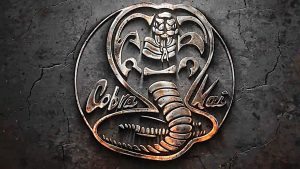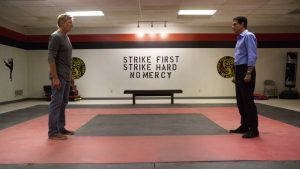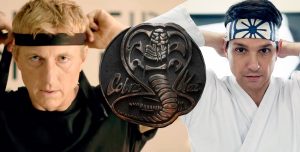Cobra Kai Had No Right To Be This Good
Months ago, I barely made it through the initial trailer for Youtube Red’s Cobra Kai series, thinking of it as little more than another shameless effort to earn key demo views on the basis of nostalgia alone. Imagine my surprise, then, when this 10-part season became one of just a few series I’ve actually been hooked on enough to binge.

Now, before I get into the nitty gritty on what makes this show so great, let’s revisit that nostalgia bit. Nostalgia taken on its own isn’t necessarily a bad thing. And, as I’ll get to in a bit, it can be used to enhance an experience rather than detract from it, but where something like Stranger Things is based in the 1980s, Cobra Kai is an 80s franchise attempting a 2018 revival, something that seemed like a long shot to put it mildly.
Well, I’m happy to report that Cobra Kai not only uses callbacks and references to the original Karate Kid to inform the narrative, it tends to use them almost exclusively in the service of character.
In terms of plot, Cobra Kai deals primarily with William Zabka’s Johnny Lawrence, prize student of the original Cobra Kai school and arch rival/bad guy to Ralph Macchio’s Daniel LaRusso. While Danny’s done quite well for himself in the generation or so since Karate Kid, Johnny’s still stuck in the past. He’s a sad, miserable, broken-down husk who blames everyone but himself for a life that’s seemingly passed him by.
Choosing to focus the bulk of Cobra Kai’s early narrative on Lawrence is an inspired choice, as we’re able to see events of the past through a new prism, and one that’s far more complex than LaRusso’s perspective might have you believe. Not only is Lawrence oddly likable, in a refreshing, douchey sort of way, but Zabka injects him with a magnetic presence that forces you to watch his every interaction, no matter how vulgar or disdainful. It’s in the loud moments of Cobra Kai where Lawrence is an assclown who deserves everything that’s happened to him, while the quiet moments remind us that appearances aren’t everything, for better and worse.
At its roots, Cobra Kai is about parenthood. More specifically, fatherhood, both in terms of its failures and successes. Daniel LaRusso may have come from a poor New Jersey family, but he found a calm, stoney and nurturing presence in the iconic Mr. Miyagi. Lawrence, on the other hand, may have come from money, but he earned little more than outright disdain from his step father and outright abuse by his own Sensei, beginning a cycle he was unable to break with his own son and seems poised to repeat as circumstances compel him to re-open his master’s old dojo.

There’s a self awareness to Cobra Kai that allows us to treat some ridiculous scenarios—like two middle-aged men in jeans and slacks facing off in karate stances on a sunlit patio—with the mix of humor and sympathy they’re meant to be taken with, but the writing takes its characters’ emotional situations seriously, allowing us to care for them and to root for them. This self awareness is largely informed by LaRusso’s wife, played by Courtney Henggeler, and it casts an even more tragic shadow over Zabka’s earnest, serious portrayal of Lawrence.
Any early trepidation I might have had over the series’ early handling of LaRusso—some episodes do paint him in a pseudo villainous light—they were stamped out by the midway point of the season, when the writing focuses a bit more on LaRusso’s family and his own changing behavior toward Lawrence and the resurgent Cobra Kai. LaRusso isn’t done growing, and, as it turns out, Lawrence provides the trigger for that growth, even if its unintentional.
In many ways, Lawrence is the catalyst for almost every character arc in Cobra Kai, kicking off growth in some and reversion in others—often an odd, disquieting mix of the two. His best and worst qualities are oddly married, which makes him a strong, hugely imperfect influence on the youth of the show.
Speaking of youth, Xolo Mariduena is magnetic as Miguel Diaz, Lawrence’s first student and a bit of a stand-in for Macchio’s original Karate Kid, while Mary Mouser is charming and likeable as LaRusso’s daughter Samantha. One of the early concerns of the show was the introduction of Robby Keene, the estranged son of Lawrence, but both the script and Tanner Buchanan’s charismatic performance quickly laid to rest any concerns I had at the outset of his arc.
In the case of Robby and most of the characters in the show, Cobra Kai presents familiar setups and even more familiar obstacles for conflict and change, but it also subverts them in clever, believable ways that help to shed the series’ cliché trappings.

In the end, Cobra Kai’s greatest achievement is somehow making its principal characters—about five of them have focused arcs, with standout supporting players—likable and sympathetic, which makes it exceedingly difficult to know who to root for when they invariably and inevitably come into conflict with one another. You might be rooting for Daniel and Johnny to fight it out once and for all in one scene, and then rooting for them to reconcile permanently after the two share a frank, effortlessly humorous conversation over a few pints in another.
Overall, Cobra Kai is a stunning achievement that shows what’s possible when quality writing is applied to even the most cliché, familiar narrative prism. Character is key, and story should always exist to inform it. If Cobra Kai can avoid verging into cartoon territory regarding its expected Season 2 antagonist, this show could be one of the most surprising and appreciated gems to hit streaming platforms in years.

I was avoiding it for the same reasons you did and now I’m looking forward to a fresh binge. Great review.
oh man, this show just won’t quit. Seas 2 excellent, Season 3 just as good. I don’t even know how they did it- they made a show with progressive points that somehow aren’t preachy, while at the same time painting people who do not keep up with all the modern wokeness in a sympathetic light. I think you nailed it, it’s some of the most self-aware writing I’ve seen.
Did you do a review of season 2? I think it was even better than season 1